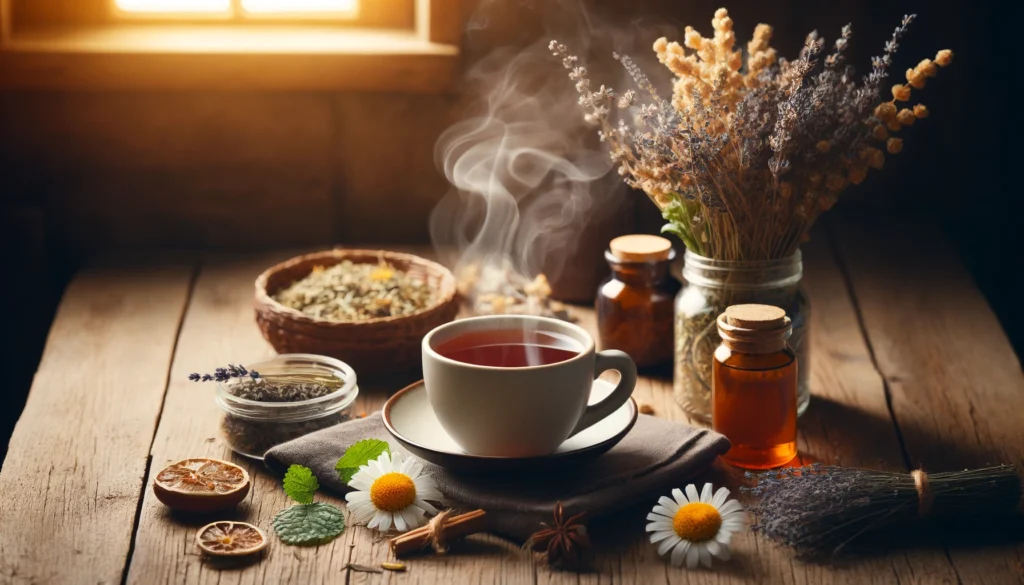Natural antidepressants encompass a variety of substances that are believed to alleviate symptoms of depression. These include vitamins, herbal supplements, and lifestyle modifications. Unlike traditional antidepressants, which often target neurotransmitters such as serotonin, natural alternatives may offer a broader scope of benefits, including enhanced mood, reduced anxiety, and improved overall well-being.
You may also like: Top 10 Herbs for Stress Relief
The Role of Vitamins in Mental Health
Vitamins play a crucial role in maintaining mental health and can be powerful allies in combating depression. Vitamin D, known as the “sunshine vitamin,” is essential for brain health. Studies indicate that low levels of vitamin D are linked to an increased risk of depression. Supplementing vitamin D, especially in regions with limited sunlight exposure, can help improve mood and alleviate depressive symptoms.
Vitamin B12 is another vital nutrient for brain health, influencing neurotransmitter production and brain function. Deficiencies in B12 can lead to mood disturbances and cognitive impairments, making it essential to ensure adequate intake through diet or supplements. Additionally, B-complex vitamins collectively support nervous system health and can help mitigate stress and anxiety.
Folate, a B-vitamin, is also crucial as it aids in the production of neurotransmitters like serotonin. Low levels of folate have been associated with depression, and increasing folate intake through leafy greens, legumes, and fortified foods can support mental health.
Herbal Supplements: Nature’s Pharmacy
Herbal supplements have been used for centuries to support mental health. Among the top 5 natural antidepressants, St. John’s Wort stands out for its potential efficacy. This herb is believed to act as a natural selective serotonin reuptake inhibitor (SSRI), similar to conventional antidepressants. However, it is important to consult with a healthcare professional before use, as it may interact with other medications.
Rhodiola Rosea is known for its adaptogenic properties, helping the body resist stress and promote a balanced mood. Studies suggest that it may reduce symptoms of anxiety and depression, making it a valuable addition to natural treatment plans.
Saffron, a spice derived from the Crocus sativus flower, has shown promise in clinical trials for reducing symptoms of depression. Its efficacy has been compared to some prescription medications, offering a natural alternative with fewer side effects.
Lavender is often used in aromatherapy for its calming effects. Inhaling lavender essential oil or using it in massage can reduce anxiety and enhance mood, providing a soothing experience for those struggling with depression.
Ginseng, another adaptogen, can help improve energy levels and cognitive function, which can be beneficial for individuals experiencing fatigue and mental fog associated with depression.
Over-the-Counter (OTC) Depression Remedies
While prescription medications are often the first line of treatment for depression, there are over-the-counter (OTC) options available. These OTC depression meds, including certain supplements, may provide support for those with mild to moderate depression.
Magnesium supplements are gaining attention for their potential to alleviate depressive symptoms. Magnesium plays a role in many physiological processes, including neurotransmitter function, and low levels have been linked to depression. Supplementing with magnesium can help restore balance and improve mood.
Omega-3 fatty acids, found in fish oil supplements, are known for their anti-inflammatory properties and support of brain health. These fatty acids can enhance mood and cognitive function, making them a beneficial addition to a mental wellness regimen.
L-theanine, an amino acid found in tea leaves, promotes relaxation without drowsiness. It can be used alongside other treatments to reduce anxiety and support a calm state of mind.

Natural SSRIs and Alternatives to Traditional Medications
Natural selective serotonin reuptake inhibitors (SSRIs) offer an alternative to pharmaceuticals like Zoloft and Wellbutrin. These natural substitutes aim to regulate serotonin levels without the side effects associated with prescription drugs.
Natural Alternatives to Zoloft, Wellbutrin, and Venlafaxine
For individuals seeking a natural replacement for Zoloft or a natural substitute for Wellbutrin, several options exist:
5-HTP (5-Hydroxytryptophan) is a precursor to serotonin and is believed to enhance mood by increasing serotonin production in the brain. It can be a valuable natural alternative for those sensitive to the side effects of traditional antidepressants.
SAMe (S-adenosylmethionine) is a naturally occurring compound in the body that plays a role in mood regulation. Supplementation with SAMe has been shown to improve mood and alleviate depressive symptoms, offering a potential alternative to conventional treatments.
Tryptophan, an essential amino acid, is a precursor to serotonin and can support mood balance. Foods rich in tryptophan, such as turkey, nuts, and seeds, can be incorporated into the diet to naturally boost serotonin levels.
Exploring the Best Natural Antidepressants
The quest for the best natural antidepressants involves a combination of supplements, lifestyle changes, and mindfulness practices. Regular exercise, a balanced diet rich in omega-3 fatty acids, and stress-reduction techniques such as meditation can significantly impact mental health.
Mindfulness and meditation practices have been shown to reduce stress and improve emotional regulation. Incorporating mindfulness into daily routines can enhance overall well-being and provide a sense of calm and clarity.
Dietary changes, such as increasing the intake of whole foods, fruits, and vegetables, can provide essential nutrients that support mental health. Avoiding processed foods and excessive sugar can also contribute to improved mood stability.
Engaging in regular physical activity, whether through structured exercise or enjoyable hobbies like dancing or hiking, can release endorphins and promote a positive outlook.

Historical Context and Current Trends
The use of natural remedies for mental health is deeply rooted in history, with ancient civilizations utilizing herbs and lifestyle practices to promote well-being. In modern times, the integration of these methods with scientific research has led to a resurgence of interest in natural solutions.
Historical Use of Natural Remedies
Throughout history, different cultures have utilized natural substances to treat mental health conditions. Traditional Chinese Medicine and Ayurveda have long prescribed herbs and lifestyle modifications to balance mental states and promote health.
In ancient Greece, philosophers like Hippocrates emphasized the importance of diet and exercise in maintaining mental health. These historical practices lay the foundation for modern approaches that integrate natural remedies with scientific insights.
Modern Scientific Validation
Recent research has begun to validate the efficacy of many traditional remedies, providing scientific backing for their use in modern treatments. Clinical trials and studies continue to explore the mechanisms by which vitamins, herbs, and lifestyle changes impact mood and mental health.
The increasing interest in personalized medicine, which tailors treatments to an individual’s genetic makeup and lifestyle, further supports the integration of natural remedies into conventional care plans. This approach can optimize treatment outcomes and enhance patient satisfaction.
Future Implications
As research continues to explore the efficacy of natural antidepressants, the potential for integrating these methods into conventional treatment plans grows. Personalized medicine, which considers an individual’s unique genetic makeup and lifestyle, may further enhance the effectiveness of natural treatments.
The future of mental health care may involve a more holistic approach, combining the best of conventional medicine with natural remedies and lifestyle interventions. This comprehensive strategy can address the root causes of depression and promote long-term wellness.

Practical Advice for Incorporating Natural Antidepressants
For those considering natural antidepressants, it is crucial to approach with caution and consult healthcare professionals. Here are some practical steps to consider:
Consulting with Healthcare Professionals
Always discuss with a healthcare provider before starting any new supplement or treatment. They can provide guidance based on individual health needs and ensure that any natural remedies used do not interfere with existing medications or conditions.
Starting with Caution
Begin with low doses to monitor the body’s response. Gradually increase dosage as needed, under professional supervision, to avoid adverse reactions and find the most effective regimen.
Monitoring Progress and Adjusting
Keep track of mood changes and overall well-being by maintaining a journal or using digital tracking tools. Regularly review progress with a healthcare provider to make necessary adjustments and optimize treatment outcomes.
Integrating Lifestyle Changes
Combine natural supplements with lifestyle changes, such as regular exercise, stress management techniques, and a healthy diet, for comprehensive support. These combined approaches can enhance the efficacy of natural antidepressants and contribute to overall mental wellness.
Conclusion
Exploring natural antidepressants offers a promising avenue for those seeking holistic approaches to mental wellness. By understanding the potential benefits and limitations of vitamins, herbal supplements, and lifestyle modifications, individuals can make informed decisions about their mental health journey. As science continues to unravel the mysteries of the mind, the synergy of traditional wisdom and modern research may illuminate new pathways to healing. Embracing a balanced approach that incorporates both natural and conventional treatments can empower individuals to take charge of their mental well-being and achieve lasting health.
Further Reading:
Natural Antidepressants: 7 Home Recipes (to Complement Treatment)
St. John’s Wort for Depression: Benefits, Risks, and Usage
How to Harness Diet, Lifestyle, and Supplements to Boost Your Mental Health
Important Note: The information contained in this article is for general informational purposes only, and should not be construed as health or medical advice, nor is it intended to diagnose, prevent, treat, or cure any disease or health condition. Before embarking on any diet, fitness regimen, or program of nutritional supplementation, it is advisable to consult your healthcare professional in order to determine its safety and probable efficacy in terms of your individual state of health.
Regarding Nutritional Supplements Or Other Non-Prescription Health Products: If any nutritional supplements or other non-prescription health products are mentioned in the foregoing article, any claims or statements made about them have not been evaluated by the U.S. Food and Drug Administration, and such nutritional supplements or other health products are not intended to diagnose, treat, cure, or prevent any disease.


